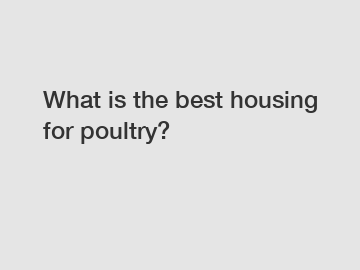What is the best housing for poultry?
What is the best housing for poultry?
The welfare and productivity of poultry are greatly influenced by the housing provided to them. Choosing the best housing for your birds is crucial for their comfort, health, and overall well-being. In this article, we will explore the various options for poultry housing and discuss the advantages and disadvantages of each.
1. Chicken Coops:

Chicken coops are the most common housing option for backyard poultry. They provide shelter, protection from predators, and a designated space for chickens to roost and lay eggs. Coops can be either stationary or portable, depending on your needs. They are usually made of wood or metal and can be easily customized according to the size of your flock.
2. Chicken Tractors:
Chicken tractors, also known as mobile coops, are ideal for those who wish to give their poultry access to fresh pasture regularly. These portable structures provide a safe and enclosed area for chickens to forage while protecting them from predators. The benefit of chicken tractors is that they allow birds to graze on different areas of the field, which results in healthier and tastier eggs and meat.
3. Free-Range Systems:
Free-range housing allows poultry to roam freely during the day, with access to a coop or shelter for resting and egg-laying. This system promotes natural behavior and provides birds with more space to navigate. However, it also increases the risk of predation and exposes poultry to environmental factors such as extreme weather conditions and diseases. Adequate fencing and shelter are essential to protect the flock in a free-range system.
4. Aviaries:
Aviaries are large enclosures that provide ample space for chickens to fly and exhibit natural behaviors. They offer enhanced welfare for poultry by allowing them to engage in activities like dust baths and perching. Aviaries can be more expensive to set up and maintain compared to other housing options, and they require adequate monitoring to prevent aggression and excessive feather pecking.
5. Battery Cages:
Battery cages, once a common housing system for commercial laying hens, have faced significant criticism due to their limited space and restriction of natural behaviors. These small wire cages provide efficient egg collection but lack the welfare considerations essential for the birds' well-being. Many countries have implemented bans or strict regulations against the use of battery cages due to ethical concerns.
In conclusion, the best housing for poultry depends on various factors such as the type of birds, location, and intended purpose. While chicken coops and tractors are suitable for backyard flocks, free-range systems offer more freedom for birds but require adequate protection. Aviaries provide excellent welfare benefits but may be costlier to set up. Battery cages, on the other hand, should be avoided due to the ethical concerns associated with confining birds in small spaces.
Ultimately, the best housing choice for poultry should prioritize their comfort, safety, and welfare. A well-designed and properly maintained housing system ensures healthier and happier birds, resulting in better quality eggs and meat for those rearing poultry for consumption. Always consider the specific needs of your flock and consult with experts or experienced poultry farmers before finalizing the housing system for your poultry operation.
If you are looking for more details, kindly visit expandable container cabin with sun house, expandable shipping container home, shipping container house for australia.

Comments